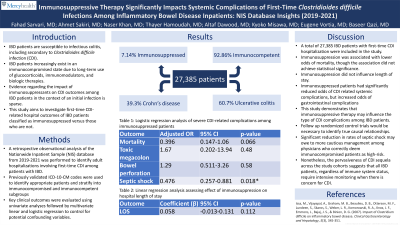Monday Poster Session
Category: IBD
P3289 - Immunosuppressive Therapy Significantly Impacts Systemic Complications of First-Time Clostridioides difficile Infections Among Inflammatory Bowel Disease Inpatients: NIS Database Insights (2019-2021)
Monday, October 27, 2025
10:30 AM - 4:00 PM PDT
Location: Exhibit Hall

Has Audio

Fahad Sarvari, MD
Mercyhealth
Rockford, IL
Presenting Author(s)
Fahad Sarvari, MD1, Ahmet Sakiri, MD2, Naser Khan, MD3, Thayer Hamoudah, MD3, Altaf Dawood, MD3, Kyoko Misawa, MD1, Eugene Vortia, MD1, Baseer Qazi, MD3
1Mercyhealth, Rockford, IL; 2Mercyhealth Rockford, Rockford, IL; 3Mercyhealth Gastroenterology, Rockford, IL
Introduction: IBD patients are susceptible to various forms of infectious colitis, including secondary to Clostridioides difficile infection (CDI). IBD patients increasingly exist in an immunocompromised state due to long-term use of glucocorticoids, immunomodulators, and biologic therapies. Evidence regarding the impact of immunosuppressants on CDI outcomes among IBD patients in the context of an initial infection is sparse. This study aims to investigate first-time CDI-related hospital outcomes of IBD patients classified as immunosuppressed versus those who are not.
Methods: A retrospective observational analysis of the Nationwide Inpatient Sample (NIS) database from 2019-2021 was performed to identify adult hospitalizations involving first-time CDI among patients with IBD. Cases classified as recurrent were excluded. Patients were then separated into immunocompromised and immunocompetent subgroups. Previously validated ICD-10-CM codes were used to identify appropriate patients. Key clinical outcomes were evaluated using univariate analyses followed by multivariate linear and logistic regression to control for potential confounding variables.
Results: A total of 27,385 IBD patients with first-time CDI hospitalization were included in the study. Within this group, 7.14% of patients were deemed immunosuppressed. Immunosuppression was associated with lower odds of mortality, though the association did not achieve statistical significance (adjusted OR = 0.396, 95% CI = 0.147-1.06, p = 0.066). Immunosuppression did not influence length of stay (β = 0.058, 95% CI = -0.013-0.131, p = 0.112). Immunosuppressed patients had significantly reduced odds of septic shock, a major systemic complication, but increased odds of gastrointestinal complications (see Table 1).
Discussion: This study demonstrates differences in the types of CDI complications among IBD patients on immunosuppressive therapy. Follow up randomized control trials would be necessary to identify true causal relationships. Significant reduction in rates of septic shock may owe to more cautious management among physicians who correctly deem immunocompromised patients as high-risk. Nonetheless, the pervasiveness of CDI sequela across the study cohorts suggests that all IBD patients, regardless of immune system status, require intensive monitoring when there is concern for CDI.

Disclosures:
Fahad Sarvari, MD1, Ahmet Sakiri, MD2, Naser Khan, MD3, Thayer Hamoudah, MD3, Altaf Dawood, MD3, Kyoko Misawa, MD1, Eugene Vortia, MD1, Baseer Qazi, MD3. P3289 - Immunosuppressive Therapy Significantly Impacts Systemic Complications of First-Time Clostridioides difficile Infections Among Inflammatory Bowel Disease Inpatients: NIS Database Insights (2019-2021), ACG 2025 Annual Scientific Meeting Abstracts. Phoenix, AZ: American College of Gastroenterology.
1Mercyhealth, Rockford, IL; 2Mercyhealth Rockford, Rockford, IL; 3Mercyhealth Gastroenterology, Rockford, IL
Introduction: IBD patients are susceptible to various forms of infectious colitis, including secondary to Clostridioides difficile infection (CDI). IBD patients increasingly exist in an immunocompromised state due to long-term use of glucocorticoids, immunomodulators, and biologic therapies. Evidence regarding the impact of immunosuppressants on CDI outcomes among IBD patients in the context of an initial infection is sparse. This study aims to investigate first-time CDI-related hospital outcomes of IBD patients classified as immunosuppressed versus those who are not.
Methods: A retrospective observational analysis of the Nationwide Inpatient Sample (NIS) database from 2019-2021 was performed to identify adult hospitalizations involving first-time CDI among patients with IBD. Cases classified as recurrent were excluded. Patients were then separated into immunocompromised and immunocompetent subgroups. Previously validated ICD-10-CM codes were used to identify appropriate patients. Key clinical outcomes were evaluated using univariate analyses followed by multivariate linear and logistic regression to control for potential confounding variables.
Results: A total of 27,385 IBD patients with first-time CDI hospitalization were included in the study. Within this group, 7.14% of patients were deemed immunosuppressed. Immunosuppression was associated with lower odds of mortality, though the association did not achieve statistical significance (adjusted OR = 0.396, 95% CI = 0.147-1.06, p = 0.066). Immunosuppression did not influence length of stay (β = 0.058, 95% CI = -0.013-0.131, p = 0.112). Immunosuppressed patients had significantly reduced odds of septic shock, a major systemic complication, but increased odds of gastrointestinal complications (see Table 1).
Discussion: This study demonstrates differences in the types of CDI complications among IBD patients on immunosuppressive therapy. Follow up randomized control trials would be necessary to identify true causal relationships. Significant reduction in rates of septic shock may owe to more cautious management among physicians who correctly deem immunocompromised patients as high-risk. Nonetheless, the pervasiveness of CDI sequela across the study cohorts suggests that all IBD patients, regardless of immune system status, require intensive monitoring when there is concern for CDI.

Figure: Logistic regression analysis of CDI complications
Disclosures:
Fahad Sarvari indicated no relevant financial relationships.
Ahmet Sakiri indicated no relevant financial relationships.
Naser Khan indicated no relevant financial relationships.
Thayer Hamoudah indicated no relevant financial relationships.
Altaf Dawood indicated no relevant financial relationships.
Kyoko Misawa indicated no relevant financial relationships.
Eugene Vortia indicated no relevant financial relationships.
Baseer Qazi indicated no relevant financial relationships.
Fahad Sarvari, MD1, Ahmet Sakiri, MD2, Naser Khan, MD3, Thayer Hamoudah, MD3, Altaf Dawood, MD3, Kyoko Misawa, MD1, Eugene Vortia, MD1, Baseer Qazi, MD3. P3289 - Immunosuppressive Therapy Significantly Impacts Systemic Complications of First-Time Clostridioides difficile Infections Among Inflammatory Bowel Disease Inpatients: NIS Database Insights (2019-2021), ACG 2025 Annual Scientific Meeting Abstracts. Phoenix, AZ: American College of Gastroenterology.
